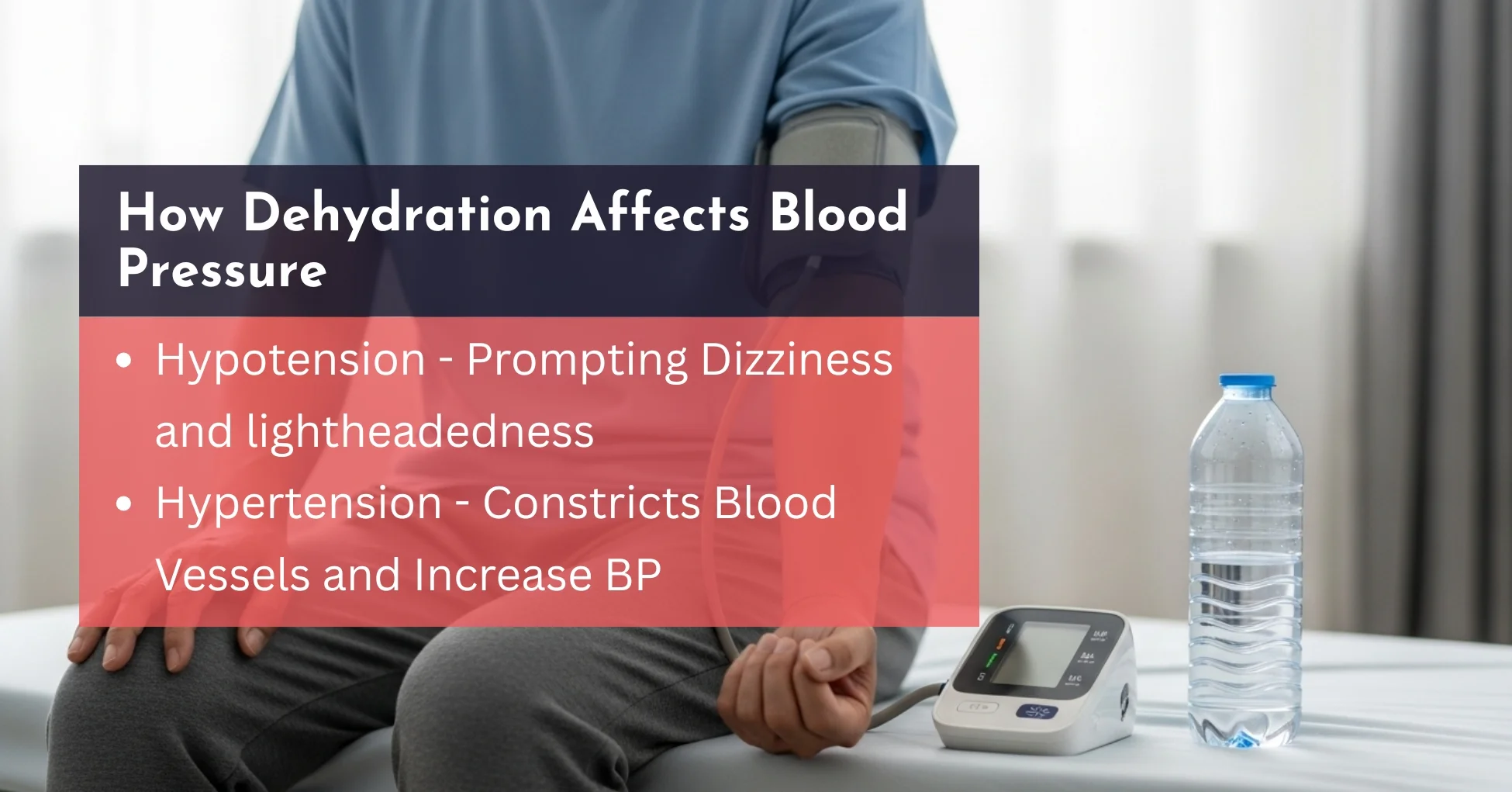
The most concerning question asked by the DMM’s user can dehydration cause high blood pressure? Certainly, dehydration can lead to high blood pressure. With insufficient fluids, the body’s blood volume reduces, which makes the heart work harder to oxygenate tissues. Blood pressure can then be read higher than normal. Vasopressin is a hormone released during dehydration that causes constriction of blood vessels, further increasing blood pressure. We shall discuss how dehydration can cause high blood pressure, how it contributes to both high and low blood pressure conditions, and how you may protect yourself against such a risk due to dehydration.
What is Dehydration?
Dehydration occurs when the body loses more fluids than it takes in, leading to an imbalance that affects normal bodily functions. Water is essential to most body processes, such as maintaining body heat, lubricating the body joints, and transporting food to the cellular level. As long as sufficient amounts are retained within the body or a sizeable amount gets lost through massive sweating, frequent urination, or vomiting.
How Dehydration Affects Blood Pressure
Dehydration may have a significant influence on blood pressure in several ways. This includes high blood pressure and low blood pressure. Mostly, it would depend on how severe the level of dehydration was and how one’s body system would react when losing its body fluids.
1. Dehydration and Low Blood Pressure (Hypotension)
At the early stages of dehydration, hypotension tends to be very common. Fluid loss by anybody causes an overall decrease in blood volume, which in turn lowers blood pressure. Less fluid pumped through your veins and arteries makes your heart pump harder to circulate blood, prompting dizziness, weakness, or lightheadedness, especially upon rising.
Dehydration can also thicken the blood, which increases the resistance in the blood vessels. Reduced blood volume and thicker blood can further lower blood pressure, resulting in hypovolemic shock in severe cases if not corrected.
2. Dehydration and High Blood Pressure (Hypertension)
Although dehydration is often linked with low blood pressure, it could sometimes cause high blood pressure. The compensatory mechanisms provided by the body prevent or maintain vital functions due to fluid loss. Hormones, such as aldosterone and vasopressin, also known as ADH, are released in the body, which keeps water and sodium in the kidneys.
If the body senses dehydration, it tries to retain the water by constricting blood vessels. Such vasoconstriction can increase resistance that the heart must pump blood against, causing an increase in blood pressure. If dehydration becomes persistent or chronic, then it can lead to sustained high blood pressure, also known as hypertension.
Link Between Dehydration and Hypertension
Dehydration helps your body fight off conditions by conserving water and salt. The entire procedure of hormone release stimulates all the aldosterone and vasopressin releases that would keep sodium in combination with the same amount of water in your kidneys. Being an essential body electrolyte, sodium directly influences your blood pressure levels. The higher the amount of sodium deposited, the greater the fluid volume will remain in your blood. This increase in blood volume can then increase blood pressure.
Another reason dehydration causes blood pressure to increase is through vasoconstriction. The constriction of blood vessels occurs due to the body signalling to the blood vessels that it feels it is in a dehydrated state and needs to conserve fluid while also increasing the blood pressure so that blood is circulated to all the vital organs and tissues. The vasoconstriction increases the resistance the heart has to overcome in circulating blood, causing increased blood pressure.
Dehydration and Blood Pressure Changes
Dehydration is not always responsible for a sudden jump in blood pressure, but it can cause significant variability. Episodic dehydration may cause unpredictable blood pressure, either low one minute or high another. Chronic dehydration or consistent fluid loss episodes result in more chronic blood pressure problems, either too high or too low.
For example:
- If you are dehydrated during physical activity or exercise, your blood pressure may increase due to the added stress on the cardiovascular system.
- Similarly, dehydration from heat exposure or sweating can lead to temporary high blood pressure as the body works to maintain fluid balance.
Risk Factors That Make Dehydration Worse
Certain conditions and lifestyle factors may increase the likelihood of dehydration, which may affect blood pressure. These factors include:
Heat and Exercise: In hot environments, strenuous exercise causes an increase in sweating and fluid loss. If not replenished, dehydration may develop.
Illnesses with Fever, Vomiting, or Diarrhea: Illnesses that cause fever or gastrointestinal illness can result in rapid fluid loss, increasing the risk of dehydration.
Medications: Some medications, like diuretics, can cause urine production to be higher, thereby leading to more fluid loss. These are medications that are often used for high blood pressure but, in turn, worsen the condition if fluid intake is not monitored appropriately.
Chronic Medical Conditions: Conditions such as diabetes, particularly when blood sugar levels are not well managed, kidney disease or heart failure increase the risk of dehydration, which may affect the regulation of blood pressure.
How to Prevent Dehydration-Related Blood Pressure Issues
The best way to avoid dehydration-related blood pressure problems is to stay hydrated and be mindful of factors contributing to fluid loss. Here are some tips for preventing dehydration and maintaining healthy blood pressure:
- Drink Plenty of Water: Aim to drink at least eight glasses (64 ounces) of water daily, and more if you’re physically active or exposed to hot temperatures.
- Track your electrolytes: If you’re exercising strenuously or in a hot environment, it’s good to drink electrolyte fluids that help replace sodium, potassium, and other important minerals.
- Limit Caffeine and Alcohol: Caffeine and alcohol both cause diuresis. This means that the fluid will be lost through urine. If you take these beverages, make sure you hydrate even more.
- Eat Hydrating Foods: Fresh fruits and vegetables are full of water. This helps hydrate your body.
- Monitor Your Blood Pressure: Monitor your blood pressure, especially if you are on medication or have conditions that put you at risk for dehydration. If you notice any large swings in your blood pressure, you can tell whether or not you need to increase your hydration. Monitor your blood pressure regularly with DMM’s Omron wrist blood pressure.
- Consult Your Physician: If experiencing frequent dehydration and blood pressure difficulties, see a doctor. They will identify whether it’s primarily caused by the issues or related to your internal system, including the cause and suitable treatment plans.
Monitoring your Blood Pressure by Using Omron Blood Pressure Monitors
Monitoring blood pressure with an Omron blood pressure monitor is one of the best ways. First, sit comfortably with your back supported and feet flat on the ground, and position your arm to your side at heart level. Put the cuff above the elbow on your upper arm, snug but not tight. Then, read out the instructions from the monitor, which are generally indicated by clicking the “start” button once to begin taking the reading.
Once done, the cuff will inflate and automatically deflate while your blood pressure readings will be displayed on the monitor screen. For accurate reading, it’s advised to have two or three readings taken approximately a minute apart from the average of the same. Monitor the blood pressure during the same time of the day in a calm state to be able to take the same measurements each time.
Omron Blood Pressure Monitor Symbols
Omron blood pressure monitors use symbols to help users understand their readings and device status. Here are the common symbols on Omron blood pressure monitors:
- Heart Icon: Indicates that the device detects your heartbeat during the measurement.
- Cuff Icon: This shows that the cuff is correctly inflated for accurate readings.
- Err Symbol: This appears if the reading has an issue, such as incorrect cuff placement or movement during measurement.
- Low Battery Symbol: This indicates that the battery is running low and needs to be replaced or recharged.
- Measurement Indicator: This indicates when the monitor takes your blood pressure reading.
- High/Low Blood Pressure Indicator: It displays when your reading is outside the normal range, helping you interpret your result.
Conclusion:
Dehydration may alter blood pressure. It sometimes lowers the reading, whereas it tends to raise the reading at other times. It usually leads to lowering blood pressure as it tends to reduce the blood volume; in some instances, however, it might result in a higher reading through blood vessel constriction and fluid retention. Staying hydrated is the key to preventing erratic blood pressure fluctuations caused by dehydration. The individual should always see a health provider and undergo regular checks for blood pressure.




